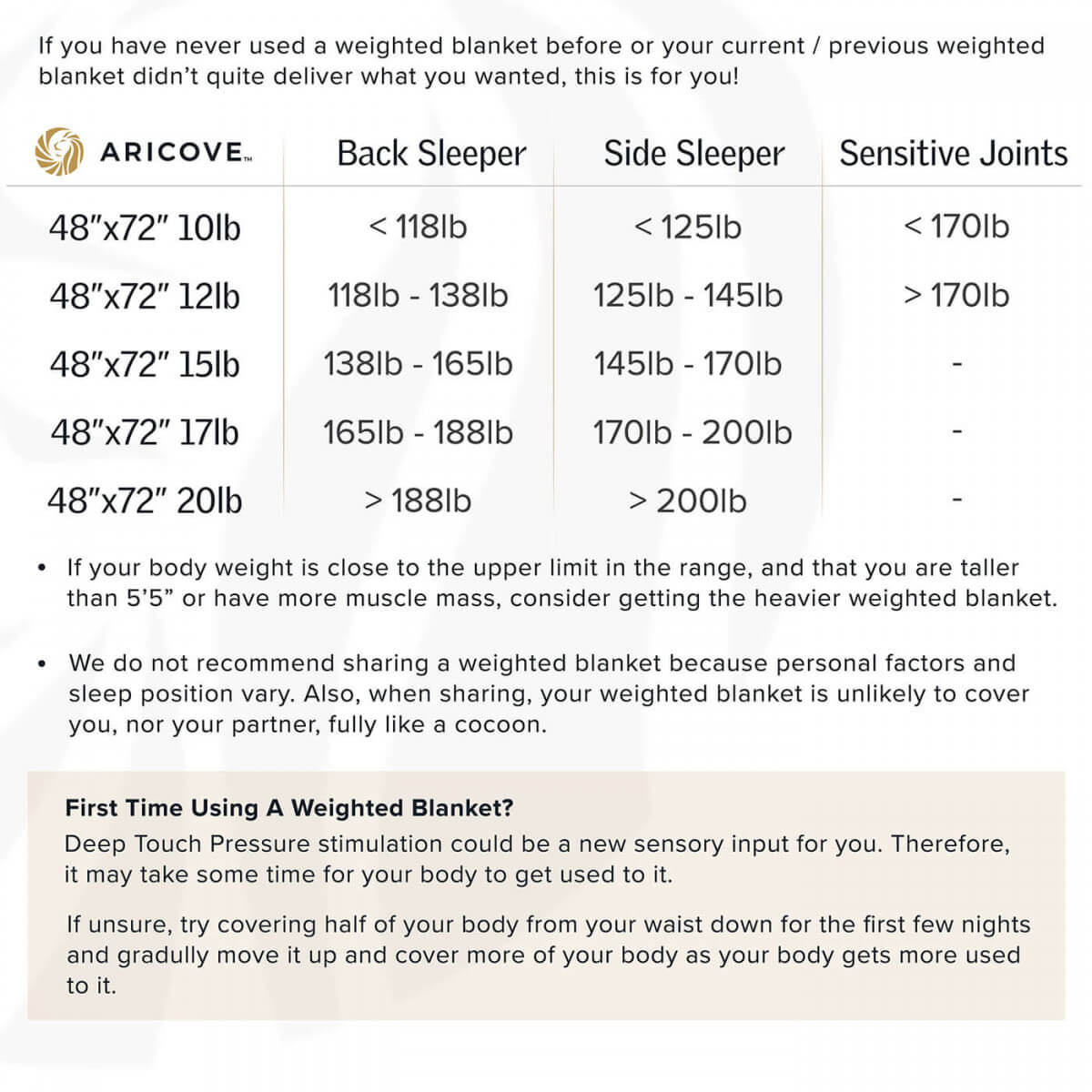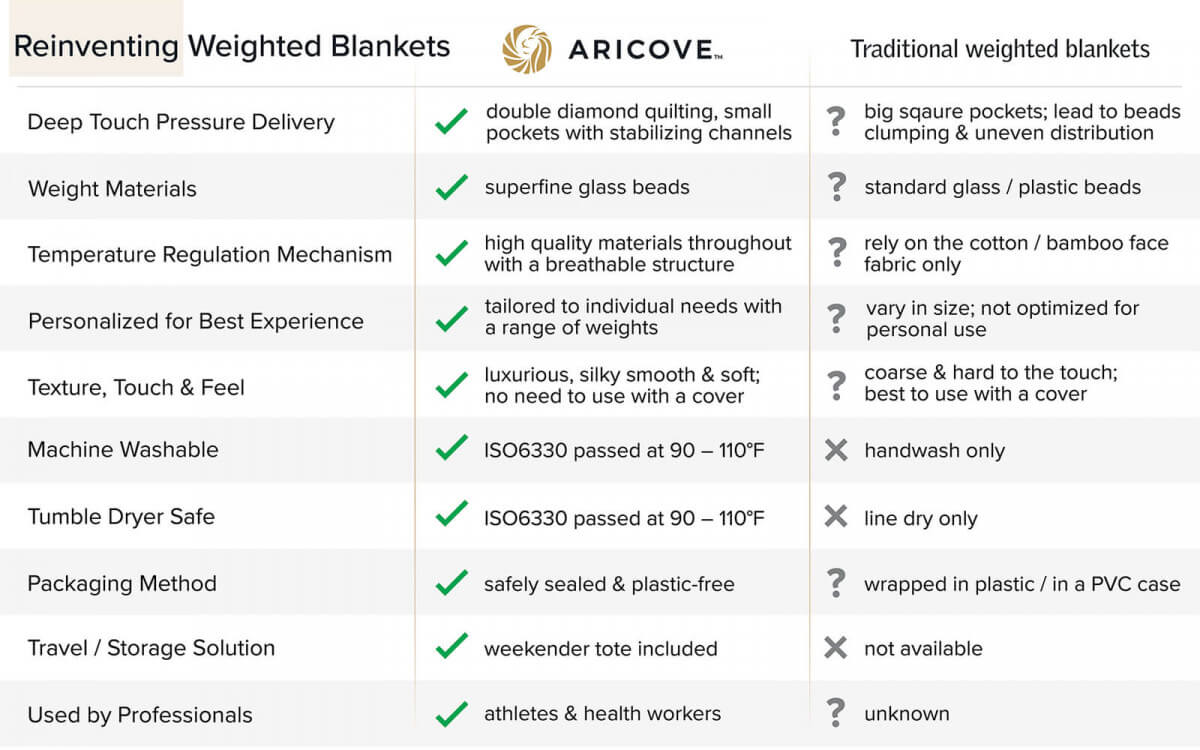Weighted blankets have become quite popular. Not only are celebrities endorsing them; they are also being recommended more often by professionals like occupational therapists and psychologists. Given their increasing popularity, there are numerous weighted blankets on the market, from a variety of retailers. Weighted blankets of varying sizes, weights, and fabrics are available for purchase, so it is important to know how to choose a weighted blanket that works for you.
- Why Choose a Weighted Blanket?
- How to Choose Weighted Blanket Fabric
- Weighted Blankets and Choosing Weight
- Other Factors to Consider When Choosing a Weighted Blanket
Why Choose a Weighted Blanket?
When you are thinking about choosing a weighted blanket, you may want to know if a weighted blanket is even a suitable option for you in the first place. There are several reasons for choosing a weighted blanket, the most common being comfort. If you suffer from pain or restlessness that keeps you awake at night, a weighted blanket can provide relief.
Weighted blankets are used in general for the treatment of insomnia, so you might consider choosing a weighted blanket if your sleep just isn’t getting better. There is actually evidence that weighted blankets are effective for the treatment of insomnia, and a recent Swedish study found that when individuals with insomnia used a weighted blanket, they slept longer and moved less while sleeping. They also reported that they had an easier time falling asleep and felt more rested in the morning.
Weighted blankets achieve these effects by applying deep touch pressure to the body. This form of pressure has been found to calm the nervous system, which has a relaxing effect and can make it easier to get a good night of sleep, especially if you’re kept awake by anxiety, stress, pain, or some other condition that makes it difficult to settle down at night.
Deciding to choose a weighted blanket for children may also be beneficial. According to research, weighted blankets can improve sleep for children who have conditions like autism or ADHD. When using a weighted blanket, children have been found to fall asleep more quickly at night, and they are more likely to sleep for the entire night.
How to Choose Weighted Blanket Fabric
If you’ve determined that a weighted blanket is a good option for you, it is important to know how to choose weighted blanket fabric. There are multiple options on the market, with some being preferred over others. Weighted blankets can be made with just about any type of fabric, such as cotton, satin, fleece, flannel, or polyester.
Since a weighted blanket must stay on your skin directly to deliver the therapeutic effects, there is only very limited amount of air in between your body and the blanket, comparing to a regular comforter or blanket, to help regulate temperature and moisture. Therefore, a weighted blanket’s materials on both the inside and outside play a key role in keeping you sleeping soundly through the natural rising and dropping in body temperature throughout the night.
If you’re a hot sleeper, fabrics like fleece or flannel are not ideal for a weighted blanket, as they are not breathable and will not have a moisture-wicking effect on sweat. For hot sleepers, there are weighted blankets made from breathable cotton. A bamboo weighted blanket is also naturally moisture-wicking and is an excellent weighted blanket for hot sleepers. On the other hand, if you tend to get cold at night, fleece and flannel blankets may be appropriate for you.
However, despite these fabrics being effective in retaining temperature, they generally have poor moisture-wicking properties which make it feel stuffy underneath. Putting a comforter on top of a breathable, moisture-wicking weighted blanket to enhance the temperature retainment may be a better solution if you tend to get cold at night.
You might also consider sensory sensitivities. Some people simply prefer one fabric over another because they are sensitive to certain fabrics, so when choosing a weighted blanket, it is important to review what fabric it is made of, and research whether this fabric will be a good fit for you.
Weighted Blankets and Choosing Weight
Another important factor when choosing a weighted blanket is selecting the appropriate weight for a blanket. The Sleep Foundation, which has a medical advisory board that oversees all of its published content, recommends that weighted blankets should be about 10% of a person’s body weight. So, for example, someone weighing 150 pounds should choose a weighted blanket of 15 pounds, and someone who weighs closer to 200 pounds would prefer a 20-pound weighted blanket.
However, what makes things confusing is that weighted blankets on the market come in different sizes. Weighted blankets of the same weight in different sizes could deliver vastly different levels of weight pressure to the body. Indeed, the 10% of body weight rule of thumb, more specifically, applies to weighted blankets that are in a personal size around 48” by 72”. It is a common misconception that the bigger a weighted blanket is, the better.
In fact, an oversized weighted blanket may lead you to using the wrong weight, making you feel as if you are trapped and unable to get in and out of bed easily. To receive the deep touch pressure benefits from your weighted blanket, it should be in a personal size that sufficiently covers your body from shoulders to toes.
There is, of course, some flexibility for those needing help with weighted blankets and choosing weight. Some people may do well with a weighted blanket that is as little as 5% of their body weight, whereas others can go all the way up to 12% of body weight and still feel comfortable.
Generally, a sider sleeper requires a lighter weighted blanket because the body muscles, joints and other body parts are more compacted in such sleeping position. Therefore, the additional weight pressure from the weighted blanket must be gentler to prevent discomfort.
More importantly, people with sensitive joints, back or hip pains are not recommended to follow the 10% of body weight rule of thumb, but instead, should use only a light weighted blanket to prevent joint pain.
In the end, a weighted blanket is a personal item, and using one that’s tailored for your needs is the only way receive the full benefits of it. You could refer to our recommendations outlined in the weighted chart guide below when choosing weight:
For toddlers aged two and up, as well as young children, a 5 lb weighted blanket is generally a suitable option, so percentage rules pertaining to weighted blankets are not a precise science.
Other Factors to Consider When Choosing a Weighted Blanket
Beyond weight and fabric, there are other factors you may want to consider when choosing a weighted blanket:
- Is the weight evenly distributed? In order to properly apply deep touch pressure to the body, a weighted blanket needs to evenly distribute the weight it uses. Look for quality blankets with even weight distribution. Also, check the mechanism behind how it achieves an even weight distribution. Generally, quilt designs that have small pockets to hold the fillers works better.
- Does it have a duvet cover? Ideally, you will find your weighted blanket to be very effective, and you will get a great deal of use out of it. This means that the blanket will get dirty and need to be washed from time to time. A washable duvet cover will protect your blanket and make it easy to keep clean.
- How does the cost compare to other products on the market? Weighted blankets can be expensive, but keep in mind that you are investing in a good night’s sleep. Many weighted blankets cost $100 or more, but some can cost upwards of $400. You may need to select a budget and find the best weighted blanket that fits within that budget, while still meeting your needs for weight and comfort.
There are certainly more factors to consider when choosing a weighted blanket. Aricove summarized all key factors nicely in the comparison chart below:
If you’re in the market for a weighted blanket, Aricove offers a cooling weighted blanket in a 5 lb version for toddlers and children, as well as 10, 12, 15, 17 and 20 lb versions for adults. Made from premium bamboo fabric, our weighted blanket is naturally soft and moisture-wicking, providing optimal comfort throughout the night. Compared to other models on the market, we are budget-friendly, so you can get the sleep you need without breaking the bank.


 United States (USD $)
United States (USD $)

